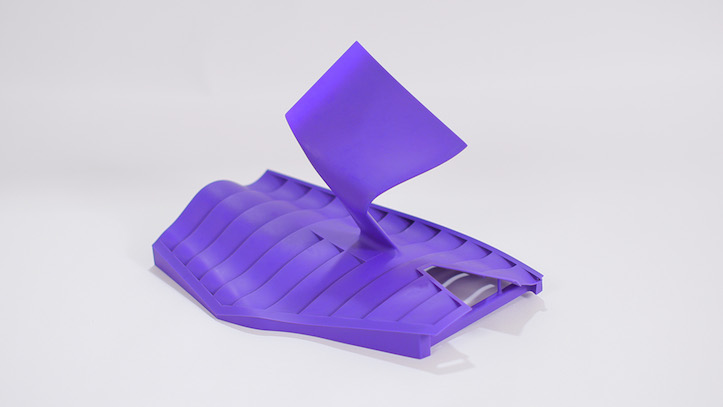 • New Accura® Composite PIV material enables more efficient part production, more accurate and higher resolution Particle Image Velocimetry (PIV) testing data
• New Accura® Composite PIV material enables more efficient part production, more accurate and higher resolution Particle Image Velocimetry (PIV) testing data
• New material alongside 3D Systems’ technology and application expertise enabling Alpine F1 Team to continue to advance aerodynamic track performance
3D Systems (NYSE:DDD) today announced the availability of Accura® Composite PIV – a new material specifically designed to address PIV testing applications used primarily in motorsports wind tunnel testing. Developed in collaboration with Alpine F1 Team (formerly Renault F1 Team), Accura Composite PIV is capable of producing rigid parts in a high-contrast color optimized for PIV testing. Parts produced using this material take significantly less time to prepare – from CAD to wind tunnel – and deliver more accurate, high-resolution data. When used as part of a complete 3D Systems additive manufacturing solution – comprising Accura Composite PIV, the company’s stereolithography (SLA) technology, software, and advanced application services – Alpine F1 Team has been able to maximize its wind tunnel investment and improve its understanding of the airflow over the car.
3D printing wind tunnel parts for aerodynamic testing is virtually a 24/7 operation as the racing team constantly works to unlock new levels of performance in the car. In particular, 3D Systems’ SLA technology has allowed Formula 1 companies to build rigid aerodynamic parts with high productivity and leverage innovations like integrated pressure tappings. These parts are used in testing that relies on a laser-based technology known as ‘particle image velocimetry’ or PIV. One challenge with taking reliable PIV measurements is the reflections of laser light from background surfaces other than the airborne particles, which reduces the image quality resulting in a loss of useful information. 3D Systems developed Accura Composite PIV - a new reflection mitigating SLA material - which Alpine F1 Team is using to print its wind tunnel model parts. Alpine F1 Team has demonstrated that the new SLA material is effective in reducing the laser reflection effect. The use of this system is helping their aerodynamicists gain a greater insight into the aerodynamic characteristics of the wind tunnel model, ultimately helping them deliver a faster racing car to the track.
The workflow to produce wind tunnel parts in other currently available materials often requires a multi-step process to achieve a suitable finish required for wind tunnel testing. The unique color of Accura Composite PIV provides the possibility to eliminate some of these steps and therefore compress the workflow for efficiency and throughput gains.
“We’ve proudly collaborated with 3D Systems for many years,” said Pat Warner, advanced digital manufacturing manager, Alpine F1 Team. “The deep expertise of their application engineers and their industry-leading solutions have been an invaluable part of our innovation team. It’s been exciting to co-develop Accura Composite PIV and see the benefits it’s bringing to our process. We produce nearly 500 parts per week for wind tunnel testing. Due to the material’s unique optical characteristics, we are now collecting more reliable data from our PIV system in the wind tunnel.”
In addition to Accura Composite PIV’s unique color, the material has a high tensile and flex modulus, with a heat deflection temperature of 100° C, which makes it ideal to withstand the rigors of wind tunnel testing. This material is formulated for use with 3D Systems’ stereolithography 3D printing technology – including the company’s 3D Sprint® software - that is designed for rapid production of large (up to 1500mm in length), high-resolution parts. At the core of 3D Systems’ solutions is the expertise of its Application Innovation Group that is relied upon for engineering expertise to help F1 teams such as Alpine F1 Team refine their vehicle designs for faster time to – and on – the track.
“Customer-centric innovation is a guiding force within 3D Systems,” said Kevin Baughey, segment leader, transportation & motorsports, 3D Systems. “Working with Alpine F1 Team to develop our newest material is another example of how we’re leveraging our F1 application expertise to develop advanced solutions that give our customers a competitive edge. We’ve been impressed by the results the Team has experienced in the wind tunnel, and look forward to seeing their success on the circuit this season.”





























































































